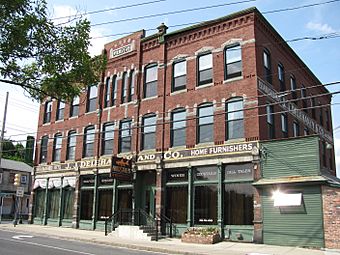Alden-Delehanty Block facts for kids
Quick facts for kids |
|
|
Alden–Delehanty Block
|
|

Alden-Delehanty Block
|
|
| Location | 858 Main St., Southbridge, Massachusetts |
|---|---|
| Area | less than one acre |
| Built | 1878 |
| Architectural style | Gothic, High Victorian Gothic |
| MPS | Southbridge MRA |
| NRHP reference No. | 89000572 |
| Added to NRHP | June 22, 1989 |
The Alden-Delehanty Block is a really old and important building. You can find it at 858 Main Street in Southbridge, Massachusetts. It was finished in 1888. This building is the biggest business building in the Globe Village part of town. It's also one of the most impressive Victorian-style buildings there. Because it's so special, it was added to the National Register of Historic Places in 1989. This means it's officially recognized as a historic place.
About the Alden-Delehanty Block
The Alden-Delehanty Block is the largest old commercial building in Globe Village. This area has many buildings from the 1800s and 1900s. The block is on the north side of Main Street. This street is also known as Massachusetts Route 131. It sits right where Main Street meets Pleasant Street.
What the Building Looks Like
This building has three floors. It is made of red brick with nice stone decorations. The first floor used to have three separate shops. Now, these shop spaces are connected. Brick pillars with stone parts separate them. Each shop area has three large windows. You enter the building through a main door.
The upper floors have many windows. On the second floor, the windows are shaped like arches. They have stone parts on the sides and top. On the third floor, the windows on the ends are rectangular. They have pointed tops. Two windows in the middle are narrow and round-arched. The window above the main entrance looks like those on the second floor. The building also has a fancy brick design near the roof. This is called a corbelled cornice. Above the middle part, there is a stepped wall. It has a panel with the name "Alden" on it.
History of the Building
The Alden-Delehanty Block was built in 1888. William E. Alden had it built. He ran a dry goods store on the first floor. A dry goods store sells things like fabric, clothing, and other household items.
When it was first built, the ground floor had shops. The second floor had offices. The third floor was a large meeting hall. The Ancient Order of Hibernians used this hall for a while. Because of this, the hall became known as Hibernia Hall.
In 1899, John Delehanty bought the building. He owned a furniture store. His store grew and eventually took up the whole building. The outside of the building still looks almost the same as when it was first built. Only small changes were made to the roof decorations.



